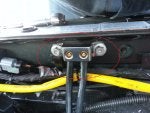This is a little DIY I made for upgrading your battery ground. I have read and heard that the Cruze ground system is not that good. So I upgraded it. This should help with upgraded sound systems, HID's, Ignition Coil (spark blow out), battery charging and more. It is very simple and only cost me about $25. I got lost of pictures and if you have questions just ask!
First I gathered the parts...I got a 4awg ground distribution block from Best Buy for $10. I liked this because it looks clean and can be added to later if needed. Than from the auto parts store of your choice I got 4awg Ground cable 49" long and last 2 (made in china) 4awg eyelets. $15.
![]()
Now I cut the cable in half and stripped off 1/2" to 3/4" of insulation off both ends of the now cut in half cable. Yes I did not use the factory eyelets that came on the cable. I liked the China one's better.
![]()
Now I did a test fit to make sure I took enough insulation off to fit the eyelets.
![]()
Now using soldier and a small torch. I heated up the eyelet filling it with lots of soldier and stuck the cable down into the hot soldier. Hold it there for about a minute so the soldier will set. Be careful its HOT. Do this to the second cable as well.
![]()
Now use shrink tube to finish off the cable and eyelet for a clean and water tight fit.
![]()
It should look like this and again do the same thing to the second cable!
![]()
Now take the other end of the 2 cables and insert them into the ground block. Tighten them down and they should look like this!
![]()
Now with everything connected and cool to the touch, let's check the resistance. .0 to .3 will work.
![]()
On the car now i drilled to small 3/16" holes just to the right of the hood latch on the engine side. I then tapped them out using a 6m x 1.0 tap. I like this location because it's not to easy to see...all but looks stock!
![]()
I installed the block and tighten the bolts to about 89"lbs...Not to tight!!! When done it should look like this.
![]()
First I gathered the parts...I got a 4awg ground distribution block from Best Buy for $10. I liked this because it looks clean and can be added to later if needed. Than from the auto parts store of your choice I got 4awg Ground cable 49" long and last 2 (made in china) 4awg eyelets. $15.

Now I cut the cable in half and stripped off 1/2" to 3/4" of insulation off both ends of the now cut in half cable. Yes I did not use the factory eyelets that came on the cable. I liked the China one's better.

Now I did a test fit to make sure I took enough insulation off to fit the eyelets.
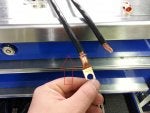
Now using soldier and a small torch. I heated up the eyelet filling it with lots of soldier and stuck the cable down into the hot soldier. Hold it there for about a minute so the soldier will set. Be careful its HOT. Do this to the second cable as well.
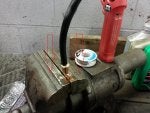
Now use shrink tube to finish off the cable and eyelet for a clean and water tight fit.

It should look like this and again do the same thing to the second cable!
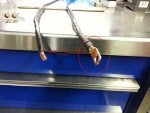
Now take the other end of the 2 cables and insert them into the ground block. Tighten them down and they should look like this!

Now with everything connected and cool to the touch, let's check the resistance. .0 to .3 will work.
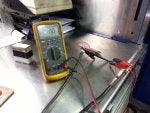
On the car now i drilled to small 3/16" holes just to the right of the hood latch on the engine side. I then tapped them out using a 6m x 1.0 tap. I like this location because it's not to easy to see...all but looks stock!
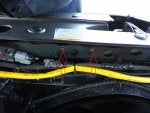
I installed the block and tighten the bolts to about 89"lbs...Not to tight!!! When done it should look like this.
